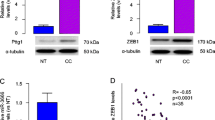Abstract
It is critical to understand the molecular mechanisms underlying the migration and invasiveness of prostate cancer (PC) for improving the outcome of therapy. A relationship of pituitary tumor-transforming gene 1 (Pttg1) and matrix metalloproteinase 13 (MMP13) in PC as well as their roles in the metastases of PC has not been studied. Here, we reported significantly higher levels of Pttg1 and MMP13 in the resected PC specimens, compared to the adjacent normal prostate tissue from the same patient. Interestingly, Pttg1 and MMP13 levels strongly correlated with each other. In vitro, Pttg1 activated MMP13, which determined PC cell invasiveness. However, Pttg1 levels were not significantly affected by MMP13. Furthermore, the Pttg1-activated MMP13 in PC cells was significantly suppressed by inhibition of PI3k/Akt, but not ERK/MAPK or JNK pathways. Together, our data suggest that Pttg1 may increase PC cell metastasis by MMP13, and highlight Pttg1/MMP13 axis as a promising therapeutic target for PC treatment.





Similar content being viewed by others

References
Saylor PJ. Prostate cancer: the androgen receptor remains front and centre. Nat Rev Clin Oncol. 2013;10:126–8.
Alva A, Hussain M. The changing natural history of metastatic prostate cancer. Cancer J. 2013;19:19–24.
Beltran H, Rubin MA. New strategies in prostate cancer: translating genomics into the clinic. Clin Cancer Res. 2013;19:517–23.
Xin L. Cells of origin for cancer: an updated view from prostate cancer. Oncogene. 2013;32:3655–63.
Lin R, Feng J, Dong S, Pan R, Zhuang H, Ding Z. Regulation of autophagy of prostate cancer cells by beta-catenin signaling. Cell Physiol Biochem. 2015;35:926–32.
Li T, Zhao X, Mo Z, Huang W, Yan H, Ling Z, et al. Formononetin promotes cell cycle arrest via downregulation of akt/cyclin d1/cdk4 in human prostate cancer cells. Cell Physiol Biochem. 2014;34:1351–8.
Gillies K, Wertman J, Charette N, Dupre DJ. Anterograde trafficking of cxcr4 and ccr2 receptors in a prostate cancer cell line. Cell Physiol Biochem. 2013;32:74–85.
Shin D, Kwon HY, Sohn EJ, Nam MS, Kim JH, Lee JC, et al. Upregulation of death receptor 5 and production of reactive oxygen species mediate sensitization of pc-3 prostate cancer cells to trail induced apoptosis by vitisin a. Cell Physiol Biochem. 2015;36:1151–62.
Hu Q, Tong S, Zhao X, Ding W, Gou Y, Xu K, et al. Periostin mediates tgf-beta-induced epithelial mesenchymal transition in prostate cancer cells. Cell Physiol Biochem. 2015;36:799–809.
Chen Q, Cai ZK, Chen YB, Gu M, Zheng DC, Zhou J, et al. Poly r(c) binding protein-1 is central to maintenance of cancer stem cells in prostate cancer cells. Cell Physiol Biochem. 2015;35:1052–61.
Wang X, Cao X. Regulation of metastasis of pediatric multiple myeloma by mmp13. Tumour Biol. 2014;35:8715–20.
Ye Y, Zhou X, Li X, Tang Y, Sun Y, Fang J. Inhibition of epidermal growth factor receptor signaling prohibits metastasis of gastric cancer via downregulation of mmp7 and mmp13. Tumour Biol. 2014;35:10891–6.
Zhang J, Wang S, Lu L, Wei G. Mir99a modulates mmp7 and mmp13 to regulate invasiveness of kaposi’s sarcoma. Tumour Biol. 2014;35:12567–73.
Yu R, Ren SG, Horwitz GA, Wang Z, Melmed S. Pituitary tumor transforming gene (pttg) regulates placental jeg-3 cell division and survival: evidence from live cell imaging. Mol Endocrinol. 2000;14:1137–46.
Caporali S, Alvino E, Levati L, Esposito AI, Ciomei M, Brasca MG, et al. Down-regulation of the pttg1 proto-oncogene contributes to the melanoma suppressive effects of the cyclin-dependent kinase inhibitor pha-848125. Biochem Pharmacol. 2012;84:598–611.
Vlotides G, Eigler T, Melmed S. Pituitary tumor-transforming gene: physiology and implications for tumorigenesis. Endocr Rev. 2007;28:165–86.
Tfelt-Hansen J, Kanuparthi D, Chattopadhyay N. The emerging role of pituitary tumor transforming gene in tumorigenesis. Clin Med Res. 2006;4:130–7.
Zhang E, Liu S, Xu Z, Huang S, Tan X, Sun C, et al. Pituitary tumor-transforming gene 1 (pttg1) is overexpressed in oral squamous cell carcinoma (oscc) and promotes migration, invasion and epithelial-mesenchymal transition (emt) in scc15 cells. Tumour Biol. 2014;35:8801–11.
Zhang G, Zhao Q, Yu S, Lin R, Yi X. Pttg1 inhibits tgfbeta signaling in breast cancer cells to promote their growth. Tumour Biol. 2015;36:199–203.
Huang S, Liao Q, Li L, Xin D. Pttg1 inhibits smad3 in prostate cancer cells to promote their proliferation. Tumour Biol. 2014;35:6265–70.
Jia W, Lu R, Jia G, Ni M, Xu Z. Expression of pituitary tumor transforming gene (pttg) in human pituitary macroadenomas. Tumour Biol. 2013;34:1559–67.
Liang CC, Park AY, Guan JL. In vitro scratch assay: a convenient and inexpensive method for analysis of cell migration in vitro. Nat Protoc. 2007;2:329–33.
Wondergem B, Zhang Z, Huang D, Ong CK, Koeman J, Hof DV, et al. Expression of the pttg1 oncogene is associated with aggressive clear cell renal cell carcinoma. Cancer Res. 2012;72:4361–71.
Conflict of interest
The authors declare that they have no competing interests.
Author information
Authors and Affiliations
Corresponding author
Rights and permissions
About this article
Cite this article
Lin, YH., Tian, Y., Wang, JS. et al. Pituitary tumor-transforming gene 1 regulates invasion of prostate cancer cells through MMP13. Tumor Biol. 37, 15495–15500 (2016). https://doi.org/10.1007/s13277-015-3796-1
Received:
Accepted:
Published:
Issue Date:
DOI: https://doi.org/10.1007/s13277-015-3796-1



